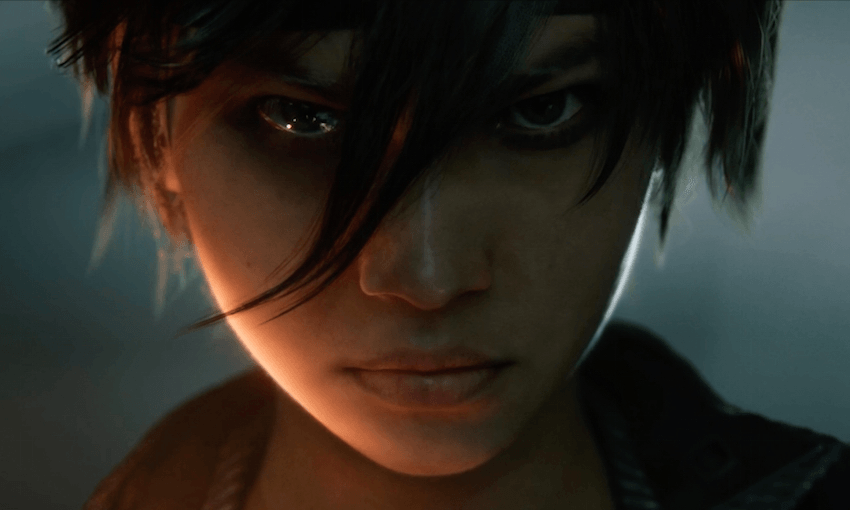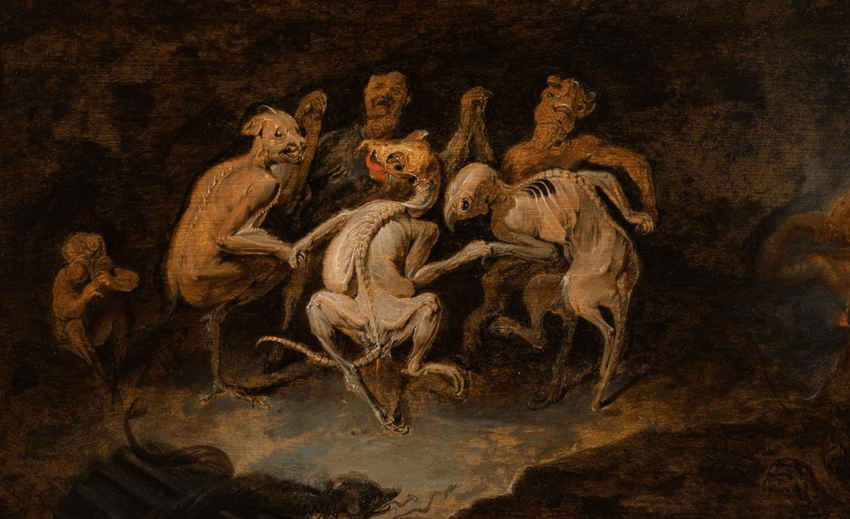Ubisoft’s partnership with collaborative content creation company HitRecord on the game Beyond Good and Evil 2 has caused an outcry among freelancers, who argue the game’s ‘fan engagement strategy’ is exploitation, plain and simple.
Ubisoft’s opening salvo at E3 this year – after their annual celebration of Just Dance – was a ten minute presentation for Beyond Good & Evil 2, a big-budget space opera follow-up to the 2003 cult classic. The game’s first trailer was released in 2008 so it was a pretty remarkable gesture to fans after years of table scraps.
Towards the end of the presentation, senior producer Guillame Brunier announced that Ubisoft would be working with ‘collaborative production company’ HitRecord to give people the chance to have stuff they’d made included in the game. HitRecord co-founder Joseph Gordon-Levitt joined them on stage to elaborate: “Whether you’re a writer, a musician, an illustrator, if you’re a pro-level artist or you’re just someone who really cares about Beyond Good & Evil and that world and you love it and you want to be a part of it, there’s going to be ways for you to contribute.”
No-one on stage mentioned whether people would be paid if their work made it into the game. That was a mistake, Gordon-Levitt addressed in a later tweet. Artists would be paid from a pool of $50,000, and HitRecord and Ubisoft would add more to the pot if they thought it was necessary. Artists would still hold the copyright to their work, HitRecord explained on its website.
HitRecord and Ubisoft genuinely didn’t seem to expect there’d be a backlash. After they left the stage, a stray microphone caught co-presenter and BG&E2 narrative director Gabrielle Schrader ecstatically shouting ‘We nailed it!’ Since that announcement, though, creative workers across the world – artists, designers, musicians, writers – have been vocally criticising the partnership, many tweeting under the hashtag #nospec.
For them, it’s difficult to escape the impression that this partnership is actually an international call for spec work disguised as a fan competition. Matt Hopkins, a game composer and sound designer under the name 2Mello, is one of the people critical of this partnership. “I am concerned,” Hopkins tells me over email, “that creative workers on my level are going to be spending a lot of time this year doing spec work thinking that it will lead to employment with a major company, because they are not as familiar with being kept at a distance from proper employment.”
But what is spec work? And why is it a problem? Jeff Ramos at Polygon explains it well in this piece, but the long and short of it is that spec work is work that you do for a company or client in the hope that they will like it and pay you to complete it for them. Ramos explains –
“In the professional space, clients will sometimes send a “request for proposal,” or RFP, asking for a large portion of the work to be done just to be considered for payment on a project. A client could have the same RFP out to multiple potential agencies or individuals, who would then be competing against one another — and giving the client a whole lot of work and ideas that they aren’t paying for.”
Karl Thiart is a concept artist and head graphic designer for Upper Hutt firm Strictly Savvy, and he’s done a lot of spec work since graduating in 2010. Thiart worked as a freelance designer straight out of university, submitting proposals to companies on freelance work portal Upwork (then known as ELance). Thiart dropped in and out of online freelancing for the next seven years, stopping to pick up jobs at Christchurch game studio CerebralFix and the Ministry of Social Development, and to teach English in South Korea.
During that time, Thiart noticed it was getting harder and harder to make a living off his work. By 2015, he tells me, he was “hitting up every single platform to try and get new clients” – Upwork, 99designs, Fiverr – “just so I could just have a couple on the books.” But he was routinely undercut by other freelancers and unable to lock down clients. “Someone puts up a proposal and… you basically work your arse off, then they choose the best ones, the top five or six, and they move on to the next round. Only the person they choose at the end actually wins the work and get the $250 at the end of the day.”
“That’s crazy,” Thiart says, recalling this all-too familiar frustration. “That’s just nuts. I did four different projects [on 99designs], got to the top five each time and just never made it through.”
Spec work can be immensely damaging to freelancers for that reason. Spec work is still work, and freelancers often sink a lot of time and energy into spec work without any guarantee that it’ll be used or that they’ll be paid for their effort. It’s a particularly sore point in the global games industry, which is already plagued with issues around its treatment of employees and contractors. In a piece for Rock Paper Shotgun, Dominic Tarason points out that
“Crunch, unpaid overtime and generally high turnover are problems for those lucky enough to get proper, salaried work. Freelancers and contractors have an even rougher uphill struggle ahead of them, and many saw Ubisoft’s use of HitRecord as exacerbating those issues with additional spec work.”
The Ubisoft/HitRecord partnership treats its offer of spec work as a fun, normal way to engage with fans. It’s being criticised because it’s bringing that attitude into the mainstream, playing down how harmful and exhausting spec work can be to workers. A freelance market built on spec work means freelancers will over-promise and undercharge. That can lead to burnout, breakdowns and mental health consequences, both for freelancers doing work that keeps getting rejected and for the lucky few who have to keep up their pace to make ends meet.
The Ubisoft/HitRecord partnership also exists in a games industry where multi-billion dollar companies and smaller studios alike are routinely overworking their employees, turning a blind eye to abuse in the workplace and laying off workers to replace them with enthusiastic ‘community volunteers’. “The one time I had a long relationship with a company in the game industry was legally a contract job,” Matt Hopkins explains as an illustration. “I was never offered proper employment.” Now, Hopkins says, “larger companies have not only found a way to keep outside workers from steady employment, but also to pay them much less (if at all) on spec.”
“This is an even more drastic version of something I feel has been happening to my generation a lot – the withholding of full-time positions in favor of keeping workers part-time with little to no benefits, or as contractors with zero benefits.”
Thiart’s also noticed that approach to recruitment and employment taking hold in the industry. “Even now, when I apply for dream jobs, quite often they give you a two-week art test which is unpaid,” he says. These art tests are virtually indistinct from spec work. Those employers are still giving you a project, and you still have to complete a large chunk before they tell you whether they want your work.
“I’ve done so many of those in the past,” he says with a grim laugh, “that it feels like a conspiracy theory: how they actually get the design for the project done quickly and cheaply. It feels like they’re preying on the artist, that artist who can’t get a job.”
Hopkins warns that this kind of approach to employment going mainstream could have damaging consequences for workers in the games industry. “The talented people whose jobs it will be replacing may leave the industry,” he says. “That is more experience and skill that will not be retained, continuing and exacerbating the problem we already have of a lack of experienced senior employees in the game industry.”
In a lengthy Medium post he wrote this earlier this week, Gordon-Levitt emphasises that “HitRecord’s contribution to Beyond Good & Evil 2 has not resulted in a single job lost.” He’s probably right that no-one working at Ubisoft Montpellier has lost their job because of this. But it’s unlikely that Gordon-Levitt’s taking into account the workers or freelancers that Ubisoft, a multi-billion dollar company that recorded “record-level profitability” in 2017, could’ve hired with that $50,000. He also doesn’t account for companies that might mimic this model in the future.
Gordon-Levitt also denies that this partnership with Ubisoft is a thinly-disguised call for spec proposals. He testifies that HitRecord won’t “pay scraps” and emphasises that HitRecord never presents itself “as a means for professional artists to earn their living.” He goes on to explain
“I understand the comparison [to spec work]. But I do think we’re substantially different. As mentioned, Ubisoft isn’t doing this to cut costs; they’re doing it to include fans. We don’t pit artists against each other in contests with one winner; everyone is allowed and encouraged to build off of one another. We don’t plagiarize unused submissions; anybody whose work is included or even influences the final product gets credit and compensation. We’re not a marketplace for freelance gigs; we’re a collaborative community.”
But just because Ubisoft and HitRecord are trying to include fans of the original game, that doesn’t mean that they’re not also asking for spec work. There are nine open projects currently on HitRecord for BG&E2, asking for geographic puzzles, posters, ‘Space Pirate Radio Songs’. They’ve already received over 4,500 submissions from fans and creators, many fully produced and edited. Hours upon hours of content.
Creating that content is work. Remixing that content – as Ramos notes, “HitRecord is built on the creative ‘remixing’ of ideas to produce a final product, often through the efforts of multiple collaborators building off each other’s contributions” – is work, even if you’re a fan who’s just dabbling with murals or electronic music because you love the original game. As Hopkins says, “if you are creating assets for a product, you deserve to be paid.”
“I have sympathy and patience for the fans who are excited about this opportunity and arguing that it is a cool thing,” he continues, “because they have entered into the industry unaware of how their willingness to work for nothing may affect it.” They’re also unaware, he suggests, of how their willingness to work for nothing might affect them. “The assets ultimately chosen to be in the game and the workers who are actually compensated will be those who are ready to go pro,” Hopkins argues. That’s because they’re often the people producing the good work, the work that gets considered – and their work is worth a lot more than a sliver of $50,000.
At the end of his email, Hopkins adds a postscript: what he’d have preferred Ubisoft to have done with that ‘ridiculously small’ pool of $50,000. “It wouldn’t solve the creeping problem of lack of full-time work for creators,” he adds as a caveat, “but they could have reviewed the portfolios of and hired 30-40 creators to make a single piece of art for the game at proper rates.” This would result in higher quality work, those workers would be better recognised for their work, and we wouldn’t be having this conversation. We’d probably be having it about someone else, some other company doing some other shitty thing, but at least it wouldn’t be about Beyond Good & Evil 2.
“However,” he observes, “their method is likely going to net them many more assets at drastically low rates.”
https://www.youtube.com/watch?v=cVLWlO7-E6k
This post, like all our gaming content, comes to your peepers only with the support of Bigpipe Broadband.



